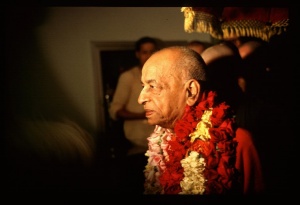CC Adi 3.18: Difference between revisions
m (1 revision(s)) |
No edit summary |
||
| Line 1: | Line 1: | ||
{{ | [[Category:Sri Caitanya-caritamrta - Adi-lila Chapter 03|C018]] | ||
<div style="float:left">'''[[Sri Caitanya-caritamrta|Śrī Caitanya-caritāmṛta]] - [[CC Adi|Ādi-līlā]] - [[CC Adi 3|Chapter 3: The External Reasons for the Appearance of Śrī Caitanya Mahāprabhu]]'''</div> | |||
<div style="float:right">[[File:Go-previous.png|link=CC Adi 3.17|Ādi-līlā 3.17]] '''[[CC Adi 3.17|Ādi-līlā 3.17]] - [[CC Adi 3.19|Ādi-līlā 3.19]]''' [[File:Go-next.png|link=CC Adi 3.19|Ādi-līlā 3.19]]</div> | |||
{{CompareVersions|CC|Adi 3.18|CC 1975|CC 1996}} | |||
{{RandomImage}} | |||
==== TEXT 18 ==== | ==== TEXT 18 ==== | ||
<div | <div class="verse"> | ||
sārṣṭi, sārūpya, āra sāmīpya, sālokya | :sārṣṭi, sārūpya, āra sāmīpya, sālokya | ||
sāyujya nā laya bhakta yāte brahma-aikya | :sāyujya nā laya bhakta yāte brahma-aikya | ||
</div> | </div> | ||
| Line 12: | Line 16: | ||
==== SYNONYMS ==== | ==== SYNONYMS ==== | ||
<div | <div class="synonyms"> | ||
''sārṣṭi''—opulences equal with the Lord’s; ''sārūpya''—the same form as the Lord’s; ''āra''—and; ''sāmīpya''—personal association with the Lord; ''sālokya''—residence on a Vaikuṇṭha planet; ''sāyujya''—oneness with the Lord; ''nā laya''—they do not accept; ''bhakta''—devotees; ''yāte''—since; ''brahma-aikya''—oneness with Brahman. | |||
</div> | </div> | ||
| Line 19: | Line 23: | ||
==== TRANSLATION ==== | ==== TRANSLATION ==== | ||
<div | <div class="translation"> | ||
“These liberations are sārṣṭi [achieving opulences equal to those of the Lord], sārūpya [having a form the same as the Lord’s], sāmīpya [living as a personal associate of the Lord] and sālokya [living on a Vaikuṇṭha planet]. Devotees never accept sāyujya, however, since that is oneness with Brahman. | “These liberations are sārṣṭi [achieving opulences equal to those of the Lord], sārūpya [having a form the same as the Lord’s], sāmīpya [living as a personal associate of the Lord] and sālokya [living on a Vaikuṇṭha planet]. Devotees never accept sāyujya, however, since that is oneness with Brahman. | ||
</div> | </div> | ||
| Line 26: | Line 30: | ||
==== PURPORT ==== | ==== PURPORT ==== | ||
<div | <div class="purport"> | ||
Those engaged in devotional service according to the ritualistic principles mentioned in the scriptures attain these different kinds of liberation. But although such devotees can attain sārṣṭi, sārūpya, sāmīpya and sālokya, they are not concerned with these liberations, for such devotees are satisfied only in rendering transcendental loving service to the Lord. The fifth kind of liberation, sāyujya, is never accepted even by devotees who perform only ritualistic worship. To attain sāyujya, or merging into the Brahman effulgence of the Supreme Personality of Godhead, is the aspiration of the impersonalists. A devotee never cares for sāyujya liberation. | Those engaged in devotional service according to the ritualistic principles mentioned in the scriptures attain these different kinds of liberation. But although such devotees can attain ''sārṣṭi, sārūpya, sāmīpya'' and ''sālokya'', they are not concerned with these liberations, for such devotees are satisfied only in rendering transcendental loving service to the Lord. The fifth kind of liberation, ''sāyujya'', is never accepted even by devotees who perform only ritualistic worship. To attain ''sāyujya'', or merging into the Brahman effulgence of the Supreme Personality of Godhead, is the aspiration of the impersonalists. A devotee never cares for ''sāyujya'' liberation. | ||
</div> | </div> | ||
__NOTOC__ | |||
<div style="float:right; clear:both;">[[File:Go-previous.png|link=CC Adi 3.17|Ādi-līlā 3.17]] '''[[CC Adi 3.17|Ādi-līlā 3.17]] - [[CC Adi 3.19|Ādi-līlā 3.19]]''' [[File:Go-next.png|link=CC Adi 3.19|Ādi-līlā 3.19]]</div> | |||
__NOTOC__ | |||
__NOEDITSECTION__ | |||
Revision as of 04:46, 27 July 2021

A.C. Bhaktivedanta Swami Prabhupada
TEXT 18
- sārṣṭi, sārūpya, āra sāmīpya, sālokya
- sāyujya nā laya bhakta yāte brahma-aikya
SYNONYMS
sārṣṭi—opulences equal with the Lord’s; sārūpya—the same form as the Lord’s; āra—and; sāmīpya—personal association with the Lord; sālokya—residence on a Vaikuṇṭha planet; sāyujya—oneness with the Lord; nā laya—they do not accept; bhakta—devotees; yāte—since; brahma-aikya—oneness with Brahman.
TRANSLATION
“These liberations are sārṣṭi [achieving opulences equal to those of the Lord], sārūpya [having a form the same as the Lord’s], sāmīpya [living as a personal associate of the Lord] and sālokya [living on a Vaikuṇṭha planet]. Devotees never accept sāyujya, however, since that is oneness with Brahman.
PURPORT
Those engaged in devotional service according to the ritualistic principles mentioned in the scriptures attain these different kinds of liberation. But although such devotees can attain sārṣṭi, sārūpya, sāmīpya and sālokya, they are not concerned with these liberations, for such devotees are satisfied only in rendering transcendental loving service to the Lord. The fifth kind of liberation, sāyujya, is never accepted even by devotees who perform only ritualistic worship. To attain sāyujya, or merging into the Brahman effulgence of the Supreme Personality of Godhead, is the aspiration of the impersonalists. A devotee never cares for sāyujya liberation.